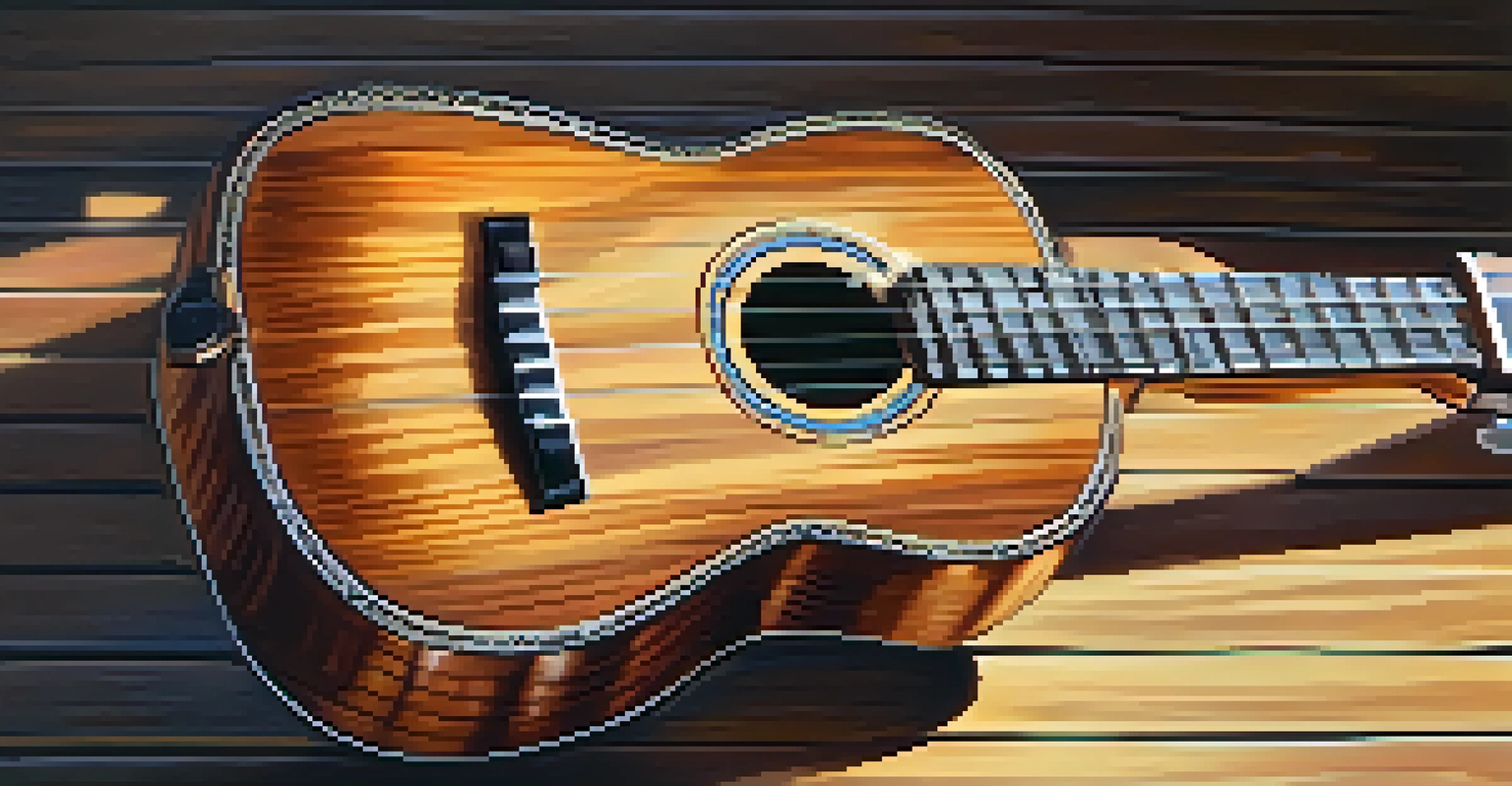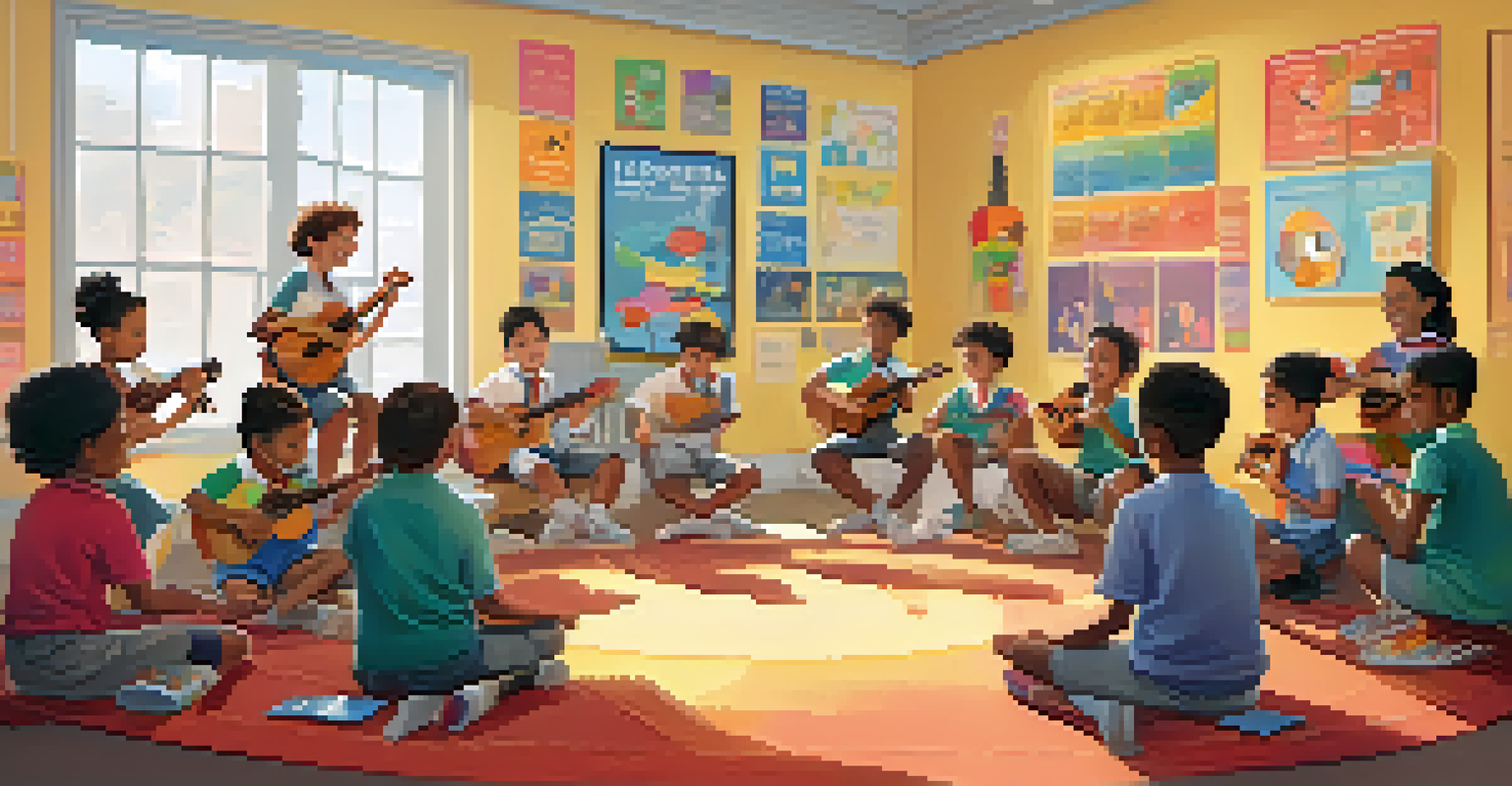The Rise of Ukulele Popularity: A Cultural and Economic Perspective

A Brief History of the Ukulele's Journey
The ukulele, a small string instrument with Hawaiian roots, has a rich history that dates back to the late 19th century. Initially introduced to Hawaii by Portuguese immigrants, it quickly gained popularity among locals and tourists alike. The instrument's charming sound and portability made it a favorite for gatherings and performances, helping to spread its influence beyond the islands.
The ukulele is a small instrument with a big voice.
As the ukulele traveled across the globe, it became associated with various music genres, from folk to pop. By the mid-20th century, it was gaining popularity in the United States, featured prominently in the music of artists like Elvis Presley and later, the Beach Boys. The blending of cultures contributed to its evolving sound, making the ukulele a versatile instrument cherished by many.
Today, the ukulele's history is celebrated in music festivals and educational programs worldwide, fostering a sense of community among players. Its journey reflects the instrument's adaptability and the ongoing fascination with its unique sound, as musicians of all backgrounds embrace it.
Cultural Influences Driving Ukulele Popularity
The resurgence of the ukulele can be attributed to various cultural influences, especially the rise of social media. Platforms like YouTube and TikTok have allowed musicians to showcase their skills, making the ukulele accessible to a younger audience. Viral videos of ukulele covers and tutorials have sparked interest among new players, creating a modern ukulele movement.

Moreover, the ukulele's association with positivity and joy has made it a symbol of fun in music. Its lighthearted sound often evokes feelings of nostalgia and happiness, appealing to both seasoned musicians and casual enthusiasts. This cultural connection has transformed the ukulele into more than just an instrument; it represents a lifestyle of creativity and carefree expression.
Ukulele's Cultural Resurgence
The ukulele's popularity has surged due to social media, making it accessible and appealing to a younger audience.
Additionally, the rise of music festivals celebrating diverse genres has provided a platform for ukulele artists. These events not only promote the instrument but foster community among players and fans, further solidifying its cultural significance in contemporary music.
Economic Factors Impacting Ukulele Sales
The economic landscape surrounding the ukulele has also played a crucial role in its rise. Affordable pricing compared to other musical instruments makes it an attractive option for beginners. With entry-level ukuleles available at various price points, more people can afford to join the musical community without a hefty investment.
Music is the shorthand of emotion.
Furthermore, the growth of online marketplaces has expanded access to a wide range of ukulele brands and models. Consumers can now easily compare prices and read reviews, leading to informed purchasing decisions. This accessibility has contributed to a steady increase in sales, as more individuals discover the joys of playing the ukulele.
As demand continues to rise, manufacturers are responding by producing higher-quality instruments at competitive prices. This trend not only supports the economy through job creation in music production but also ensures that players have access to instruments that enhance their musical experience.
The Ukulele in Education: A Growing Trend
The ukulele's popularity in educational settings is another factor driving its growth. Many schools have started incorporating the instrument into music programs due to its simplicity and ease of learning. Educators appreciate that students can quickly pick up the ukulele, making it an effective tool for teaching music fundamentals.
Additionally, the ukulele's ability to foster collaboration among students has made it a favorite in group settings. Playing together helps develop teamwork and communication skills, while also encouraging creativity. As more educators recognize these benefits, the ukulele is becoming a staple in music curricula across the globe.
Economic Factors Boost Sales
Affordable pricing and online marketplaces have made it easier for beginners to join the musical community with the ukulele.
With the rise of online learning platforms, ukulele lessons are now more accessible than ever. This digital shift allows students of all ages to learn at their own pace, further spreading the instrument's appeal. As a result, we’re seeing a new generation of ukulele players emerge, ensuring the instrument's legacy continues.
Ukulele Icons: Influencers Shaping the Scene
The impact of prominent ukulele players has significantly shaped the instrument's popularity. Artists like Jake Shimabukuro and Israel Kamakawiwoʻole have brought the ukulele into the limelight, showcasing its versatility and emotional depth. Their unique styles and engaging performances have inspired countless individuals to pick up the instrument and explore their musical talents.
Social media has further amplified the presence of these ukulele icons, allowing them to connect with fans globally. Through live streams, tutorials, and performances, they create an accessible space for aspiring musicians. This interaction not only builds a sense of community but also motivates newcomers to dive into their own musical journeys.
As these influencers continue to push the boundaries of what the ukulele can achieve, they pave the way for future generations. Their dedication to the craft and willingness to innovate ensures that the ukulele remains a relevant and cherished instrument in the music world.
The Ukulele in Popular Music Today
The ukulele's presence in contemporary popular music is undeniable, with artists across genres incorporating it into their tracks. From indie to pop, the instrument's cheerful sound adds a unique flavor to songs, making them stand out. This trend has not only broadened the ukulele's appeal but also encouraged musicians to experiment with its sound in new and exciting ways.
Collaborations between ukulele players and well-known artists have also contributed to the instrument's visibility. By featuring the ukulele in mainstream music, these artists help introduce the instrument to wider audiences, sparking interest among fans who may have never considered playing it. This cross-pollination of genres continues to enrich the music scene.
Educational Growth of the Ukulele
The ukulele is increasingly incorporated into music education, helping students learn music fundamentals and fostering collaboration.
As more musicians embrace the ukulele, its role in popular music will likely evolve further. This ongoing integration ensures that the ukulele remains a relevant and beloved instrument for years to come, appealing to both new listeners and longtime fans alike.
Looking Ahead: The Future of the Ukulele
As we look to the future, the ukulele's trajectory appears bright. With a growing community of players and enthusiasts, its popularity shows no signs of waning. The instrument's ability to adapt to changing musical landscapes will likely continue to draw in new generations, ensuring its place in the music world.
Moreover, the increasing emphasis on mental health and well-being aligns with the ukulele's joyful nature. As people seek creative outlets to relieve stress and connect with others, the ukulele offers an accessible way to foster joy and community. This trend may further boost its popularity as more individuals turn to music as a form of self-expression.

Ultimately, the ukulele's blend of cultural significance, economic accessibility, and emotional connection positions it as a timeless instrument. As it evolves alongside contemporary music and culture, the ukulele will undoubtedly continue to resonate with players and listeners for many years to come.